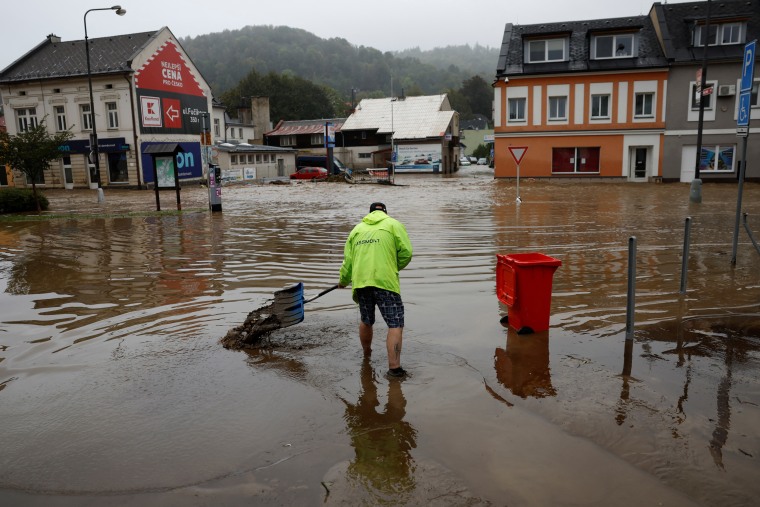Central Europe braces for more flooding as death toll rises
The death toll from the worst flooding central Europe has seen in at least two decades rose on Monday, as authorities in some areas counted the cost of the trail of destruction left by the deluge while others prepared for the crisis to reach them.
Border areas between the Czech Republic and Poland were hit hard over the weekend as heavy rain that has fallen since last week and surging water levels collapsed some bridges, forced evacuations and damaged cars and houses.
At least 15 people have died in flooding from Austria to Romania.
Poland’s government announced a state of natural disaster in affected areas and said that it had set aside 1 billion zlotys ($260 million) to help victims.
Prime Minister Donald Tusk said he was in touch with the leaders of other affected countries and that they would ask the European Union for financial aid.
Michal Piszko, mayor of the Polish town of Klodzko along the Czech border, said waters had receded there but help was needed.

“We need bottled water and dry provisions… half of the city has no electricity,” he told Polish radio.
Television footage showed streets in Klodzko strewn with debris and mud. In the Polish town of Nysa a hospital was evacuated, with patients including pregnant women and elderly people taken away in rafts.
In Jesenik, a Czech town across the border that was inundated on Sunday, a clean-up was starting after waters receded to show damaged cars and debris on the streets.
“There were two metres of water that ran through the street… There are many, many destroyed cars,” said resident Zdenek Kuzilek. “Telephones are not working, there is no water, no electricity.”
In eastern Romania, where villages and towns were submerged over the weekend, Emil Dragomir, mayor of Slobozia Conachi, told Romanian television the flooding had a devastating impact.
“If you were here you would cry instantly because people are desperate… there were people who were left with just the clothes they had on,” he said.
While water was receding in some areas, others were shoring up defences for floods heading their way.
The Topola reservoir in southern Poland had overflowed and water was gushing towards the village of Kozielno. Local authorities said residents of several nearby towns and villages would be evacuated.
In Wroclaw, in the southwestern region of Silesia, the mayor Jacek Sutryk said the city of some 600,000 people was preparing for water levels peaking on Wednesday.
In the Czech Republic, a rising Morava River had put Litovel, a town 230 km (140 miles) east of the capital Prague, around 70% under water and shut down schools and health facilities, its mayor said in a video on Facebook.
Flooded parts of the northeastern Czech city of Ostrava forced the closures of a power plant supplying heat and hot water to the city as well as two chemical plants.
In Romania, the flooding killed six people over the weekend. An Austrian firefighter died on Sunday. In the state of Lower Austria that surrounds Vienna, two men aged 70 and 80 were found drowned in their homes, a police spokesperson said on Monday.
State news agency PAP reported five deaths in Poland, and in the Czech Republic one person died, a police official said.
Slovakia’s capital Bratislava and the Hungarian capital Budapest were both preparing for possible flooding as the River Danube rose.
Hungarian Interior Minister Sandor Pinter said efforts were focused on keeping the river and its tributaries within their banks and said up to 12,000 soldiers were on standby to help.
In Austria, the levels of rivers and reservoirs fell overnight as rain eased but officials said they were bracing for a second wave as heavier rain was expected.





